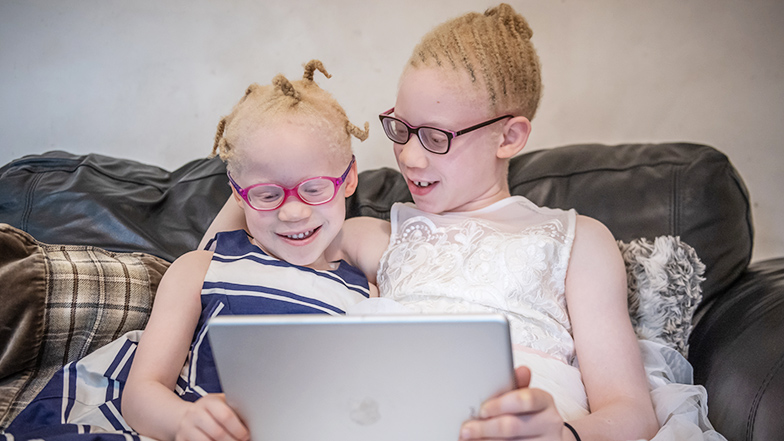Young people living with sight loss are being encouraged to apply for a smart device to help them enjoy the same benefits of being online as everyone else.
The charity Guide Dogs has launched ‘Tech for All’ which provides free assistive technology to all children with visual impairment aged between three and 18 in the UK.
The scheme aims to help 3,500 children and young people in the first six months and potentially 10,000 by the end of 2022, if the pilot is successful. So far, 89 youngsters in Scotland have signed up.
While technology in schools remains the responsibility of local authorities, the charity says it is important for children with no or low vision to also have their own device at home.
The iPads and iPhones, which older children can opt for, have accessibility features built-in, such as screen magnification, voiceover and audio descriptions, to make many activities easier, like reading in larger fonts and enlarging photos.
Guide Dogs will provide online guides and tutorials to help children make the most of their new devices, who will be able to independently play their favourite games, listen to music or audiobooks, watch shows and connect with friends in the format that works best for them.
Kamsi, a nine-year-old from East England who has ocular albinism, a condition which reduces the colouring of the iris and the retina, was previously given an iPad by Guide Dogs through a special grant scheme.
Her mum, Eremina, said: “Kamsi is really into technology, and we have a family laptop, but it’s quite functional – she was only able to use it when I was sitting with her. She really wanted an iPad but I couldn’t afford to get her one. We applied for a grant from Guide Dogs, with a supporting letter from her visual impairment teacher. We didn’t realise all the different ways an iPad could help her until we had it. She’s quickly learnt how to use the technology herself.
“The iPad is really user friendly, and she can navigate between screens herself, she’s learnt to use passwords, and can enlarge text and images to a size that works for her. There are the obvious education benefits, like reading e-books, but it’s mostly about her being able to play and have fun – which is really important for all children.”
Kamsi now has access to the internet and has been researching albinism, which has helped her learn about her condition and enable her to discuss it with her mum, improving her communication skills and knowledge. She also uses FaceTime to keep in touch with her grandma, dad, and uncle.
Her three-year-old sister, Nnenna, has the same condition and she will also receive an iPad from Guide Dogs as part of Tech for All.


Emma Brown, Guide Dogs Scotland’s services marketing officer, said: “Technology is so important for children with sight loss to develop learning, creativity and independence. This offer can support children with learning at home, as well as just having fun.”
Emma Foulds, director of marketing and strategy at Guide Dogs, said: “Technology is a great enabler and grants children a sense of normality, confidence and independence both socially and academically. The faster technology moves, the better their wellbeing. However, technology is still not accessible enough and this can be frustrating for both child and parent.
“Parents and guardians feel vision impairment can make it harder for children to make friends and parents stress that socialisation with other children is a vital part of their child’s development.”
She added: “Tech for All has been designed to enable children with sight loss to be more independent and do whatever it is they want to do or what their friends are doing. Whether it is Facetiming their mates, playing games, reading or learning, the accessibility features on an iPad or iPhone can be key to unlocking a child’s world and maximising their potential.”
Guide Dogs is working with BT Enterprise to supply the Apple devices directly to Tech for All applicants, with Apple iPhones loaded with pre-paid EE mobile SIMs to help young people and their families get connected straight away.
BT will also be providing learning activities for the Apple devices to ensure each child or young person can get the most from their device, helping them to live independently.




